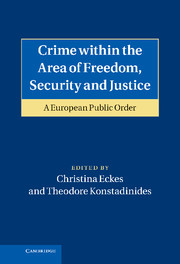Book contents
- Frontmatter
- Contents
- Contributors
- Acknowledgements
- ABBREVIATIONS
- Introduction
- 1 EU criminal justice: beyond Lisbon
- 2 The European Union policy against corruption in the light of international developments
- 3 The EU's anti-money laundering agenda: Built on risks?
- 4 EU anti-money laundering regulation: Multilevel cooperation of public and private actors
- 5 The legal framework of the European Union's counter-terrorist policies: full of good intentions?
- 6 Organised crime: developments and challenges for an enlarged European Union
- 7 The Europeanisation of extradition: how many light years away to mutual confidence?
- 8 The European Evidence Warrant: Mutual Recognition and Mutual (Dis)Trust?
- 9 Law and order and internal security provisions in the Area of Freedom, Security and Justice: before and after Lisbon
- 10 The external dimension of the EU's Area of Freedom, Security and Justice
- Index
- References
8 - The European Evidence Warrant: Mutual Recognition and Mutual (Dis)Trust?
Published online by Cambridge University Press: 01 June 2011
- Frontmatter
- Contents
- Contributors
- Acknowledgements
- ABBREVIATIONS
- Introduction
- 1 EU criminal justice: beyond Lisbon
- 2 The European Union policy against corruption in the light of international developments
- 3 The EU's anti-money laundering agenda: Built on risks?
- 4 EU anti-money laundering regulation: Multilevel cooperation of public and private actors
- 5 The legal framework of the European Union's counter-terrorist policies: full of good intentions?
- 6 Organised crime: developments and challenges for an enlarged European Union
- 7 The Europeanisation of extradition: how many light years away to mutual confidence?
- 8 The European Evidence Warrant: Mutual Recognition and Mutual (Dis)Trust?
- 9 Law and order and internal security provisions in the Area of Freedom, Security and Justice: before and after Lisbon
- 10 The external dimension of the EU's Area of Freedom, Security and Justice
- Index
- References
Summary
The European Evidence Warrant (EEW) is a key element of the EU's attempt to improve criminal justice cooperation within Europe. The evidence warrant builds on the European Arrest Warrant (EAW) and several other Framework Decisions that are based on the principle of mutual recognition to develop more integrated EU criminal justice. It aims to facilitate speedier cooperation in the transfer of evidence between Member States in criminal proceedings. This chapter critically analyses the evidence warrant and considers what its adoption can tell us about the development of mutual recognition in EU criminal justice. The central argument is that the European Evidence Warrant demonstrates the problems of enforcement-led criminal justice cooperation in the absence of mutual trust. It concludes that the Stockholm Programme offers the potential for change towards more complete criminal justice cooperation or the continuation of the status quo. Section 1 critically analyses the historical background to the evidence warrant. Section 2 considers the adoption of the Framework Decision on the European Evidence Warrant and examines how the measure contributes to European criminal justice. Section 3 examines mutual recognition and mutual trust in light of the evidence warrant legislation. Finally, section 4 considers the future for criminal justice cooperation and evidence transfer under the newly adopted Lisbon Treaty and Stockholm Programme. While the focus in this essay is on the evidence warrant, certain aspects of the debate concerning the arrest warrant are raised insofar as they shed light on the development of mutual recognition and cooperation in criminal justice.
- Type
- Chapter
- Information
- Crime within the Area of Freedom, Security and JusticeA European Public Order, pp. 224 - 248Publisher: Cambridge University PressPrint publication year: 2011
References
- 12
- Cited by



